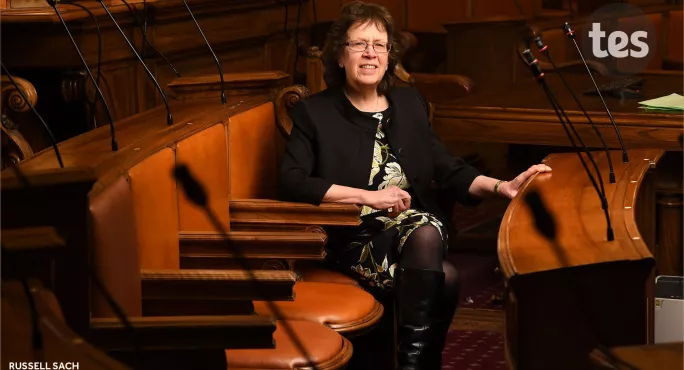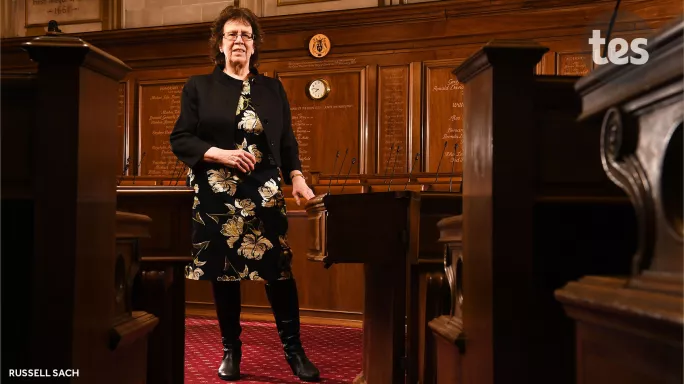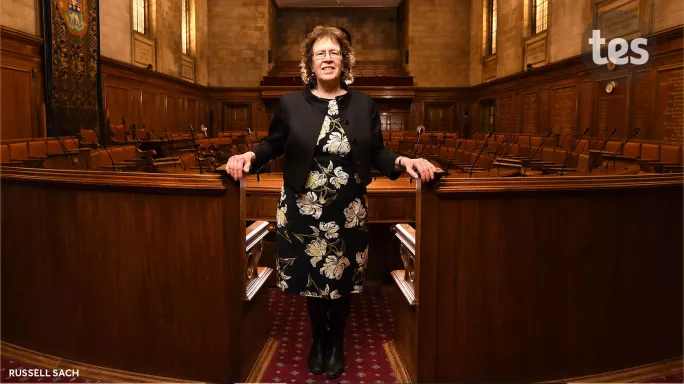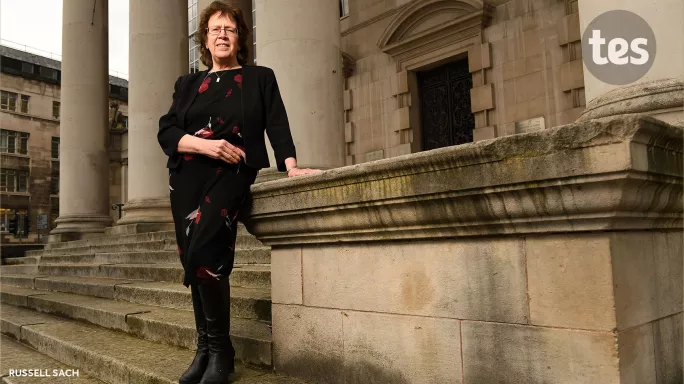- Home
- The ‘deeply challenging’ fall-out from academisation
The ‘deeply challenging’ fall-out from academisation

As the council leader of one the largest cities in the North of England Judith Blake is in a position of power and responsibility.
She is also a leading voice on education nationally for town halls through the Local Government Association.
But she warns that when it comes to schools local authorities increasingly find themselves with a lot of responsibility but much less power.
School places: ‘Councils need to be able to tell academies to take on more pupils’
Profile: Meet the primary teacher opening doors for SEND
Exclusive: Councils’ school support teams cut back
Blake speaks as the chair of the LGA’s children and young people’s board, which deals with education. She replaced Anntoinette Bramble in the role last year.
She tells Tes she wants to help councils to influence policy but is concerned that at a time when the government is pushing for more local decision-making through devolution deals, education is not part of that picture.
Local education authorities are responsible for fewer and fewer schools as more convert to academy status and despite retaining the responsibility for allocating school places, councils cannot simply open new schools themselves.

“So many powers have been taken away from local authorities and yet we still have responsibilities whether it’s around the whole area of child protection, school performance or the provision of school places,” says Blake.
“It feels very much to all of us at the LGA, and this is cross party, that there is a real sense of frustration growing.
“In an era where we are talking more and more about the importance of devolution it is made very clear that when it comes to education centralisation is the name of the game.”
For Blake, taking local government out of education decision making doesn’t make sense.
“Running schools from Whitehall through the academies programme, for example, is something which remains very challenging for local authorities, particularly in areas where we have seen massive growth in numbers of young people and we no longer have the ability to open new schools.”
At present there is a presumption that new schools will be academies and councils who identify a need for a new provision in their area have to apply for a competition to be run to finding a trust to run the school.
Local knowledge is being sidelined
Blake believes this is sidelining both local democracy and local knowledge.
“It just feels like we are the offer of last resort when we want to be on the front foot. The larger authorities are the planning authorities. We know where new build is going to be, we know where places will be needed and we know the communities that we are elected to represent.
“We know that you can put a school in a certain locality and certain sections of that community will really struggle to access that school for a whole range of different reasons.
“We know this because we have been representatives of those communities for many many years. We understand the dynamics and not to be able to use that knowledge is deeply deeply challenging.”
She speaks with direct experience of running an education authority which has faced pressure on school places in recent years.

Blake became the first ever female leader of Leeds City Council in 2015 and before this was the council’s executive member for responsible for schools.
She tells Tes that education is a driving reason why she, and a lot of other politicians, have chosen to get involved in public life in the first place.
“The really great thing about being an elected member is that you get to see examples of fantastic practice - teachers going in and doing things that are extraordinary. So many of the teachers we have go above and beyond and work with people in their charge and have real concern about the circumstances these children are in.
“Some children come to school hungry, or don’t have the right uniform. Seeing what teachers do is extraordinarily humbling and we want to make sure that we do everything we can to make sure teachers have access to the best services and support that they can.
“If you talk to elected members at any level, education, skills and preparing young people to be able to take up the opportunities we are creating is one of the main reasons for engaging in politics in the first place.
“It gets a hold of people and it can come from a place of frustration from their own experience of their families’ experience, it can come from within their own community.”
This is partly true for Blake. But she also reveals how a personal tragedy when she was a teenager affected her later life and politics.
Initially reluctant to talk about her time growing up in Leeds, she later explains why.
“When I was 17 years old I was involved in a car crash as a passenger where one of my best friends died. I was in hospital for three months. I had been sitting in the back seat and I could have died.
“It had a profound effect on me. It is not something that I talk about, it is perhaps something I should talk about more.
“I was 17 and I think it was at a time when you were just expected to pull yourself together and get on with things.”
She says that the incident undoubtedly shaped who she is and what she wanted to do.
Blake recalls how having attended Leeds Girls’ High, a direct grant grammar school, she returned to education after the accident to study her A levels at Park Lane College in the city.
“When I went to the college I saw something completely different. People who were motivated to recognise the full potential of all young people. It was a complete step change for me to go from what was perhaps a very stifling approach to then see this focus on personal support. It has really informed my approach to politics ever since.”
Blake left Leeds after Park Lane and went to university in Kent where she read history.
“I left Leeds as quickly I could and went as far away as I could but have come back through a circuitous route.”
Throughout the interview Blake admits that she is not really keen to speak about herself or her personal life.
She speaks with pride when she says that all four of her children work in the public sector and that her youngest child Olivia has just been elected as the Labour MP for Sheffield Hallam.
Throughout her life a key theme seems to be a desire to help people achieve their potential who might otherwise miss out.
Before becoming a councillor she worked in adult education teaching English as a second language in Birmingham and recalls how she worked with groups of Chileans who had left the country during the Pinochet regime.
Battling ‘an injustice’
And many years later, after becoming the councillor responsible for education in Leeds, she put the authority at the heart of a legal campaign which she saw as trying to overturn an injustice for thousands of pupils.
In 2012 there was major controversy over the way in which English GCSE grade boundaries were moved between January and June, meaning pupils sitting the same paper later in the year had to achieve higher marks to earn a C.
Blake helped push Leeds Council to the forefront of a national campaign to have exams regraded through a legal battle in which they argued that the actions of two exam boards, AQA and Edexcel, had been unlawful.
The case was unsuccessful in court but Blake has no doubt that the campaigners were in the right.

“It’s interesting looking back on this,” she says. “I was listening to Desert Island discs and Glenys Stacey was on, the head of Ofqual who was overseeing this at that time, and she described this as the most difficult time in her career.
“I got the sense listening to it that she knew something had gone wrong but that she felt powerless to change it.
“All of us knew something profoundly unjust had happened. Many young people around the country really suffered as a result of this and effectively had their exams downgraded.
“The same standard of work would get two different grades at different points in the same year. When you are actually aware of real cases of young people who have failed to get on to their chosen next steps, further study or apprenticeships because of a decision that was not of their making, it was so grossly unfair.
“Although we didn’t actually win the court case the feeling from everybody involved was that it was something that we had to embrace and to challenge.”
Blake points out that in many cases it was disadvantaged pupils who were the ones who missed out on C grades they needed.
Today she worries that disadvantaged pupils are still at risk of missing out because of the pressure on schools to achieve results.
She tells Tes that schools off-rolling pupils has become a “huge concern” for local authorities.
“Here in Leeds the council’s children and young people’s scrutiny board has started an inquiry into all of the issues around young people missing from education and looking at the issues of schools who are suspected of off-rolling.
“The increase in the number of parents who are told by their schools that it might be a good idea if they thought about home schooling their children with an absence of any thought that this would be the best thing for these young people is a real concern that it is most vulnerable children who are being affected by this.”
Blake says that many people are trying to get to grips with the problem and praises Ofsted for focusing on off-rolling through its inspections.
But she says her biggest concern about vulnerable pupils is the most obvious one - funding.
“The big thing for us now is the massive crisis that is coming in SEND.
“We are talking about a £1.5 billion shortfall and we are now going to see this work through the system.”
Blake argues there is an urgent need for the government to review SEND provision across the country.
So much of representing the voice of town halls in recent years has been focused on arguing against - and coping with - public funding cuts. But Blake is determined that this should not be what defines local government.
“We are responsible people so we are always committed to making things work but I think the point that gets missed is that with more funding we could be doing so much more,” she says.
“We are now in the period after a general election and we are in the realms of speculation - everyone is trying to look at the manifesto to see what policies will come through.
“But if we feel that that the policies are moving still further away from involving local government at the heart of provision for young people then we will work cross party to make sure our voice is heard, and we will exert influence as much as we possibly can to get the best for our young people.”
CV: Judith Blake
- Attended Leeds Girls High.
- Attended Park Lane College, Leeds.
- Studied history at the University of Kent.
- Elected as councillor on Leeds City Council in 1996.
- Executive member for children’s services and deputy leader of Leeds City Council .
- Leader of Leeds City Council.
- Chair of the LGA’s children and young people’s board.
Keep reading for just £1 per month
You've reached your limit of free articles this month. Subscribe for £1 per month for three months and get:
- Unlimited access to all Tes magazine content
- Exclusive subscriber-only stories
- Award-winning email newsletters



